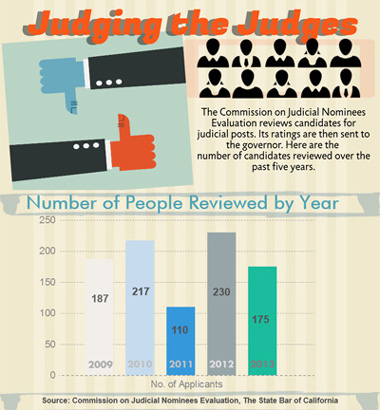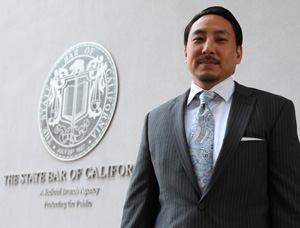Q&A: Judging the
judges
On April 12, Venice attorney Jason P. Lee took over as
chair of the State Bar’s Commission on Judicial Nominees Evaluation (JNE),
which vets all candidates being considered for a judicial appointment by the
governor. He recently spoke with staff writer Amy Yarbrough about JNE’s work
and the personal rewards that come with serving on the commission.
Why don’t you start by telling me how you came to be
involved with the JNE commission?
 When I was in law school, two judges had been mentoring me
on what being a lawyer was about, the type of dedication and professionalism
that was required. That was important because I was essentially the first
lawyer in my family. That really struck my interest in the judiciary and I
continued to keep contact with them and really felt a debt to them. When I
returned to San Francisco following going to school in D.C. and a couple years
at the SEC [Securities and Exchange Commission], I became part of the Asian
American Bar Association’s judiciary committee which did something similar to
JNE, in that candidates who were seeking appointment would ask that we write
them a letter of recommendation to the governor. We would do an investigation where
we would rate them in same categories that JNE had. Later, I became a board
member of that organization then applied to get on JNE and got on.
When I was in law school, two judges had been mentoring me
on what being a lawyer was about, the type of dedication and professionalism
that was required. That was important because I was essentially the first
lawyer in my family. That really struck my interest in the judiciary and I
continued to keep contact with them and really felt a debt to them. When I
returned to San Francisco following going to school in D.C. and a couple years
at the SEC [Securities and Exchange Commission], I became part of the Asian
American Bar Association’s judiciary committee which did something similar to
JNE, in that candidates who were seeking appointment would ask that we write
them a letter of recommendation to the governor. We would do an investigation where
we would rate them in same categories that JNE had. Later, I became a board
member of that organization then applied to get on JNE and got on.
If you were talking to someone who was thinking about
applying for the commission, what would you tell them was the most rewarding
aspect of this type of volunteer work?
 |
| Lee |
I’d say two things. One, it is extremely rewarding to
participate in the process, vetting the governor’s potential appointees, to
have a hand in ensuring that only those who are qualified serve. Of course, the
governor makes the ultimate decision who to appoint, and even if we deemed him
not qualified the governor could still appoint that person.
The second is, on a personal level, you really get to work
with the top lawyers in the state, folks who have an investment in making sure
that the judiciary is top notch. And they just want quality judicial bench
officers there to preside over their matters. Working closely with these folks,
you get exposed to all sorts of practice areas that you normally would not.
What should someone know if they’re thinking of getting
involved with JNE?
They should know about those two rewards. I think they walk
away from the service really happy that they did it. The other side of it is
that it’s important work that requires a lot of time.
I was going to ask about the time commitment.
Yeah, it takes a lot. I mean in the vice chair/chair
positions, you’re donating a lot of hours to a worthwhile cause. But even an
individual commissioner will take the lead, will be involved in three to five
investigations [at a time]. You think about the cycle, and it
really never stops because names, in a large part, just keep on coming. I think
someone who is considering becoming a commissioner should recognize that it
will require a lot of time.
As chair now, what are your plans?
There’s something which I’m told has never been done before,
which is more proactively reaching out to the legal and at-large community so
that folks understand more about what we do. Our sort of internal process, in
terms of specifics, is highly confidential so that folks can’t know who we are
vetting and even the ultimate resolution of those investigations. But it
shouldn’t be a mystery how we go about doing that. I think communities that
don’t have that context of understanding what it takes to become a judge can
get sidetracked by the JNE process. I feel like it’s absolutely mission critical
that that message gets across to folks to understand and know what to expect
when they get the call from JNE that they are about to undergo the
investigation. As part of that effort, I’ve sent letters out to over 300
voluntary bar organizations offering a direct line to me and to basically say, “Look.
Anytime you have an event that talks about the judicial selection process, I
will come and if I am not available I will make sure that another commissioner
can come.” I just think it’s important to get the word out. Because I’ve seen
in individual investigations how a lack of preparation and context can make the
process much more difficult.
As you mentioned before, much of what the commission does
is confidential, including whom you are vetting and any information you might
receive about them. What can you tell us about the process?
The governor has his own internal process. They do their
vetting and they send out the list of names which comes to us and those names
are then assigned out to individual commissioners. The candidate is contacted,
and they go through an investigation process. It involves a targeted mailing
that can go out to the candidate’s personal references. These mailings with
questionnaires go out to any opposing counsel or any other person they’ve
interacted with in cases the candidate feels are significant or they’ve had in
the last five years. Another part of it is there’s a randomized mailing that
goes out to folks who may be in the candidate’s practice area or in the same regional
bar organization, or in a specialty that candidate claims to have. Then there’s
the interview process where a candidate is, a couple days before the interview,
told of any negative findings. People have said, for example, a candidate lacks
judicial temperament because they lost their cool at various times. So that
information comes up to us and we give the candidate an opportunity to address
those things at the interview. And after that there’s a meeting. The assigned
commissioners will present their findings and the commission votes on the
ratings. Those ratings are then communicated to the governor.
Being on this side of things, would you ever want to go
through this process?
That’s a good question. The JNE process is thorough, and I think when you fill out your application, the thing you have
to keep in mind is you actually need to be as forthright as possible. Because,
along with a lot of probing questions, they ask very personal things about you
and there’s also a general waiver at the end of the application that
essentially allows – though it’s a power that we use with a lot of reservation
– us to get things like your appointment records and other things you would not
normally be able to obtain absent a subpoena.
So, your question of “Would I?” I would love that because it
would mean that I’m almost there, that the governor is seriously considering my
appointment. But, talk about knowing everything about you and your practice for
your entire career. Now being on this side, I’m glad that this body does this
because it does a lot to ensure that only the qualified folks are appointed.
I see a former Sacramento Bee journalist has joined JNE.
How has this affected the work you do?
You’re talking about Claire [Cooper]? We’ve had one
journalist before her who served before I became vice chair. Both of them
understand the confidentiality requirements. I can say it’s a definite benefit
to the commission. [A] prior reporter had a history of doing investigative journalism. It’s that extra dimension that I think adds to our
work. Public members, in general, we need them on the commission because it
gives that extra insight into the process.
So you think that non-lawyer members bring a different
perspective, different skills?
Oh absolutely. I think lawyers in general think a certain
way. For example, we just brought on somebody who is a sheriff whose posting, I
think, is in the jails. It’s a whole different perspective that would not be
available absent their participation in the process.
Is there anything else you would like people to know
about the work you’re doing?
We’re actively reaching out, not only for folks to
understand what we do, but also to have people apply. And that deadline is June
2. There’s this idea that JNE takes a lot of work. It does. But what we’ve done
in the last couple of years is make that process easier for the folks who are
serving. So the commissioner can really focus on the substantive part of the
work, which is figuring out whether this person is qualified or not. That has
been a godsend.
Active members of the State
Bar, former members of the judiciary and members of the public who are
interested in serving on the 2015 Commission on Judicial Nominees Evaluation
(JNE) must submit their application by June 2. For more information about JNE, go to the
commission’s home
page.